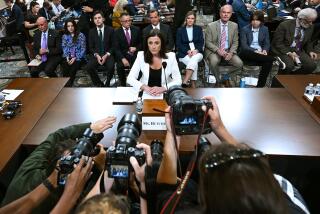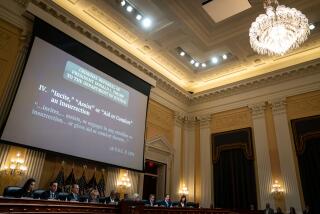Regan Contradicts McFarlane on Sale : Chief of Staff Contends That Reagan Opposed 1985 Israeli Shipment to Iran
- Share via
WASHINGTON — White House Chief of Staff Donald T. Regan, flatly contradicting former National Security Adviser Robert C. McFarlane, asserted publicly for the first time Thursday that President Reagan had opposed a 1985 Israeli arms shipment to Iran.
The issue of whether the President approved an August, 1985, arms shipment is crucial not only as a test of the veracity of Regan and McFarlane, but also because Israeli shipments of U.S. military goods to Iran without presidential approval would have been illegal and cause for the suspension of U.S. aid to Israel.
On Thursday, the continuing inconsistency between McFarlane and Regan on this issue forced congressional investigators to begin deciding for themselves which man is more believable. House Intelligence Committee Chairman Lee H. Hamilton (D-Ind.) praised Regan’s candor, but two senators who have heard both men testify said that they tend to believe McFarlane.
Hamilton said that Regan had given the committee “comprehensive and candid testimony,” and added that he was “believable and well received by the members of the committee.” Asked whether Regan was more believable than McFarlane had been, Hamilton said: “I wouldn’t want to make that comparison.”
“I’ve known Bud McFarlane a long time,” said Sen. William S. Cohen (R-Me.), one of the two senators. “I’m impressed with the detail he provided the committee and I feel he would not have undertaken a mission of that importance--of sending a signal, a direct communication, to the Israelis--without authorization, and that authorization would have come from the President.
“Whether he (the President) recollected or not is another matter, but I think Bud McFarlane made it very clear about his recollections of events.”
Sources said that McFarlane, in his testimony before the Senate Intelligence Committee Thursday, contradicted Regan’s testimony not only on the issue of presidential approval for the 1985 arms shipments but also on the question of whether some profits from the arms sales were diverted to the contras with the approval of higher-ups. Regan has said that neither he nor the President knew or approved of the diversion of arms sale profits to the contras; McFarlane said he did not believe it could have happened without the approval of the chief of staff, according to sources.
McFarlane, a former Senate aide, was the President’s national security adviser until December, 1985, when he resigned after a bitter falling out with Regan.
The White House chief of staff testified before the House Intelligence Committee for almost two hours Thursday while McFarlane was making an unusual second appearance before the Senate Intelligence Committee, which ended three weeks of closed hearings on the matter.
Even after several weeks of hearings, the leaders of both committees admitted that they never will know precisely how the profits from the Iranian arms sales were diverted to the contras until they receive the testimony of former NSC aide Oliver L. North and McFarlane’s successor as national security adviser, John M. Poindexter. Both so far have refused to testify, citing the Fifth Amendment protection against self-incrimination.
Regan’s testimony appeared to be drawn directly from an internal White House chronology of events prepared by North, who was fired last month for allegedly arranging the profits diversion. At least one part of the chronology is known to be inaccurate.
Israeli officials have insisted that they shipped arms to Iran in late 1985 with the President’s approval. The Israeli shipments preceded a written presidential “finding” that cleared the way for direct U.S. arms shipments to Iran. It was not signed by Reagan until Jan. 17, 1986.
Asked about the August, 1985, shipment as he left the House committee room, Regan told reporters: “To the best of my recollection, the President was against the shipment at that time. . . . To the best of my knowledge, we did not approve of it.”
He said that, when the President learned of the shipment after the fact, he decided to condone it to avoid endangering the lives of American hostages being held by Middle East factions allied with the Iranian leadership.
Regan added: “I would put it this way: We put up with it. It happened. It was water over the dam. We didn’t want to reopen it.”
Reports Verbal Approval
Senate committee Chairman Dave Durenberger (R-Minn.) said McFarlane testified that he received direct verbal approval from the President during a White House meeting in 1985 attended by three other Administration officials. He indicated that the three others were Regan, Secretary of State George P. Shultz and Defense Secretary Caspar W. Weinberger.
Cohen and Dennis DeConcini (D-Ariz.), both of whom have heard the testimony of Regan and McFarlane, said that they found McFarlane’s testimony more convincing--particularly on the 1985 shipments. DeConcini added that he cannot believe either the 1985 arms shipments or the diversion of funds to the contras took place without the knowledge of Regan.
“For a man that’s supposed to be an adviser to the President, the chief adviser and chief of staff, it’s hard to believe he didn’t know what was going in or coming out,” DeConcini said. “Nobody gets in to see the President without Regan’s approval, including the vice president. Maybe Nancy’s the only exception to that.”
Referring to Regan, DeConcini added: “I’m not saying he’s lying, but maybe he forgot.”
No Certain Knowledge
Sources said that while McFarlane insisted from his understanding of White House decision-making procedures that North could not have been acting without higher authority, he said that he had no certain knowledge that the diversion of funds was approved by Regan or the President. McFarlane, who has said publicly that he first learned of the contra connection from North last May during an arms delivery flight to Tehran, told the committee that he did nothing to verify what he was told on that day nor did he report the matter to high White House officials, according to sources.
Durenberger said that he agreed with DeConcini that the President created an atmosphere that encouraged North’s actions.
“What we’re talking about is an environment in which the President was frustrated by the inability to deal with the issue of Nicaragua, where everyone is encouraged in a broader sense to be helpful to the Nicaraguan resistance,” Durenberger said. “So in that environment, a doer like Ollie North does.”
Durenberger also said that he viewed McFarlane’s testimony as more authoritative than that of Regan, Shultz or Weinberger, the three other presidential aides he said were present when the 1985 arms shipments were approved.
“I would characterize Bud McFarlane’s testimony as much more explicit, more definitive than that of the chief of staff, the secretary of state or the secretary of defense,” he said. He added that the President “with a little bit of reminding” would probably acknowledge that he approved the 1985 arms shipments.
Testified From Recollection
But Durenberger cautioned that McFarlane testified only from recollection while others still serving in the government have had the benefit of looking at documents from the period in question.
Even Regan said that none of the witnesses should be trusted entirely.
“We’re working without notes, without a review of what has happened. . . . People are being asked about specific dates . . . two years ago. Most of us can’t remember what we had for lunch two days ago.” DeConcini said that, even if it is proven that North acted without explicit approval in diverting funds to the contras, the President as well as the White House chief of staff are guilty of creating an atmosphere in which a low-level aide believed he could do whatever was necessary to aid the contras during the period Congress had banned military aid to the rebels.
“It’s my hunch that the attitude of the chief of staff and perhaps the President through general conversations that went on there for a long period of time was ‘those so and sos up on the Hill have cut off aid (to the contras), so you do whatever you can,’ ” he said. “And he may have said ‘don’t get caught, don’t break the law,’ I don’t know. It was an environment that went down to the troops.”
But DeConcini said he believes the President’s statement that he did not approve the diversion of funds. “I don’t think he would attempt to put that over on the American public if he did,” he said.
Weinberger also appeared before the House committee Thursday and Atty. Gen. Edwin Meese III was scheduled to appear today. Army Col. James Steele, former head of the U.S. military advisory group in El Salvador, was questioned by Senate committee aides Thursday about his alleged involvement with the private contra supply effort.
Sources said that the Senate committee tried without success to subpoena Saudi businessman Adnan Khashoggi, who was believed to have been involved in financing the Iranian arms shipments, and Albert A. Hakim, an associate of retired Maj. Gen. Richard V. Secord, who is believed to have had a key role in the contra supply effort.
Staff writer Maura Dolan contributed to this story.
More to Read
Get the L.A. Times Politics newsletter
Deeply reported insights into legislation, politics and policy from Sacramento, Washington and beyond. In your inbox twice per week.
You may occasionally receive promotional content from the Los Angeles Times.










